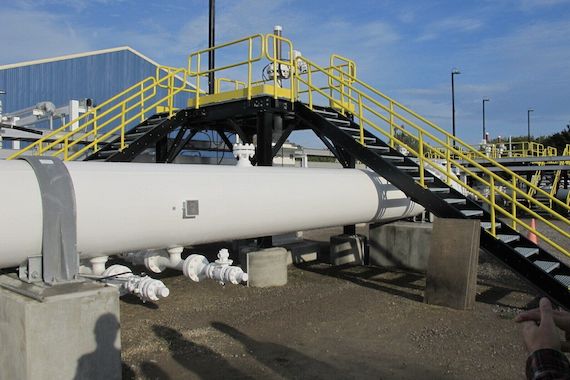This photo taken in 2016 shows an above-ground portion of Enbridge Line 5 at a pump station in Mackinaw City, Michigan. (Photo: The Canadian Press/John Flesher)
The federal government and Alberta energy giant Enbridge are trying to exploit a “dormant” and outdated contract with the United States to prevent the closure of Line 5, human rights and advocacy groups say. Environment, in new court documents.
The dispute comes amid a recent wave of complaints filed in a district court in Wisconsin, where Enbridge is battling with a Native American band over the future of the cross-border line.
Several of them directly target a central part of the company’s defense: a 1977 treaty between Canada and the United States that was intended to prevent disruptions in the flow of oil and gas between the two countries.
Regardless of international treaties, the United States has an obligation to defend the rights of indigenous peoples, including self-government of their natural resources, according to one of these documents from the American Center for International Environmental Law.
“Given the multiple risks associated with the pipeline […]“Continued operation of Line 5 would violate the United States’ obligations to protect the right to life of indigenous communities,” it reads.
“If the pipeline contract requires the United States to waive environmental regulations and actively seek to ensure the continued operation of the pipeline despite these serious risks of harm, it would mean that the United States is failing in its duty to guarantee basic human rights .”
Enbridge and the Bad River Band of Lake Superior Chippewa are appealing a June district court ruling that gave Enbridge three years to move the pipeline out of the band’s area.
The collection of amicus curiae briefs filed last week also includes a brief from Michigan Attorney General Dana Nessel, herself involved in an appeal case over Line 5, which runs through the Great Lakes downstream of the Strait of Mackinac runs.
Dana Nessel and the state have been trying to shut down the pipeline since 2019, fearing an anchor strike or similar accident that could disrupt one of the most ecologically sensitive regions in the northeastern United States.
In her presentation, Dana Nessel agrees that Enbridge’s argument regarding the treaty is unsound, simply because nothing in the treaty itself expressly prevents governments or courts from enforcing human rights.
“Enbridge and Canada essentially argue that the 1977 treaty allows Enbridge to invade other people’s land, sovereign land at that, indefinitely, depriving the landowner of any recourse,” she writes.
“This argument is baseless, has no basis in treaty text, and undermines the fundamental rights of sovereign governments and landowners.”
In its own appeal brief, Enbridge argues that the treaty’s “basis of supremacy” is the same as that of the U.S. Constitution and that it prevents “obstructing, diverting, diverting or in any way interfering with the transportation of hydrocarbons in transit.”
Line 5, which has followed the same route since it was built in 1953, carries about 540,000 barrels of oil and natural gas liquids daily through Wisconsin and Michigan to refineries in Sarnia, Ontario.
It supplies key refining plants in Ontario and Quebec and is critical to the production of jet fuel for major airports on both sides of the Canada-U.S. border, including Detroit Metropolitan Airport and Toronto Pearson Airport.
Enbridge and its allies say a shutdown would cause significant economic disruption in the Plains and Midwest of the U.S., where the pipeline supplies raw materials to refineries in Michigan, Ohio and Pennsylvania.
The company, which is still seeking regulatory approval for a 66-kilometer diversion around the indigenous community, fears three years may not be enough to get it up and running. The company also insists that a 50-year contract signed with the band in 1992 allows it to keep the existing line open.
However, the band wants the 12-mile pipeline in its territory to be closed as quickly as possible and also challenges the terms of the financial grant and profit-sharing agreement that accompanied the district court’s decision.
To that end, a separate filing from two U.S. restitution law experts alleges that District Judge William Conley made an error in calculating that deal, which included a $5.1 million backlog.

Incurable food practitioner. Tv lover. Award-winning social media maven. Internet guru. Travel aficionado.





;Composite=(type=URL,url=https://images.radio-canada.ca/v1/assets/elements/16x9/outdated-content-2013.png),gravity=SouthEast,placement=Over,location=(0,0),scale=1)

